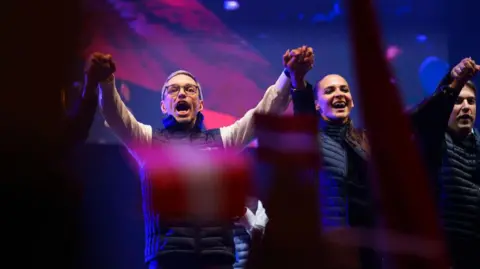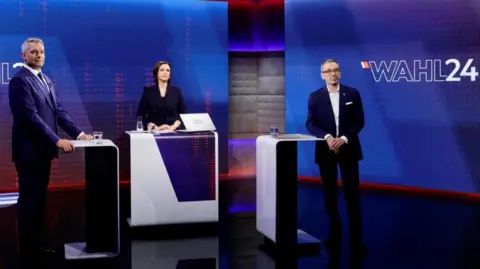 Good pictures
Good picturesAustrians go to the polls on Sunday in a general election in which the far-right opposition Freedom Party (FPÖ) tops the polls for the first time.
Five years ago, the party failed to form a coalition government with the conservative People’s Party. The scandal is known as Ibiza-gate.
But now, under the leadership of Herbert Gieglin, the FPÖ has achieved a historic victory. It narrowly leads the ruling conservatives in opinion polls, with the opposition Social Democrats in third place.
Even if the Freedom Party comes first, no party is expected to win enough seats for an absolute majority and forming a coalition will be difficult.
The FPÖ has successfully tapped into concerns about migration, rising inflation, the war in Ukraine and anger over the handling of the Covid pandemic, and has been polling for months at 27%, two points ahead of the conservative ÖVP. , which predicts a “photo ending”.
“Opportunities have never been greater,” says one of its campaign videos. “So President of the people (People’s President) Herbert Kickle Your freedom, your safety, yours Prosperity (Prosperity) and your peace… Let’s build Castle Austria!”
It shows Giggle saying he wants to be “your servant and your protector.”
Kiklin’s use of this word President of the peopleUsed to describe Adolf Hitler in the 1930s, it has worried some Austrians.
For them it is an uncomfortable reminder of the FPÖ’s origins. It was founded in the 1950s by former Nazis. Protesters waved “Nazis out of parliament” banners at the party’s final election rally on Friday night.
Like other far-right European parties, the FPÖ combines tough rhetoric on immigration and Islam and promises to reduce what it sees as Brussels’ interference in national affairs.
But Gigl aligned his party closely with Hungary’s Prime Minister Viktor Orbán, who has become a self-styled champion of “liberal democracy” and shares a more conciliatory tone when it comes to Russia.
The Freedom Party leader called European Commission President Ursula van der Leyen a “warmonger” and opposed sanctions over Russia’s aggression in Ukraine.
Political analyst Thomas Hofer said Giggling’s rhetoric has always been “very harsh and divisive”, but he believes an election victory will not clear the way for him to lead a coalition government.
“This will be a completely new situation in the history of the Second Republic of Austria, because the Freedom Party came close twice, but never in first place, at least not at the general election level,” he said. BBC.
The party stunned European politics under leader Jörg Haider in 1999, coming second in the election and joining a conservative-led government. When it joined a coalition in 2018, Herbert Gigl was interior minister until the party was engulfed in corruption revelations.
Now the leader, the fiery Gikl has turned his party into what is perhaps its best conclusion.
“It will be a kind of shock wave for the other parties, but if the FPÖ comes first, it does not mean that they will also get the presidency. This is by no means clear,” said Thomas Hofer.
The FPÖ leader is widely disliked by other parties in Austria.
The conservative People’s Party, led by Austria’s current president, Karl Nehhammer, has repeatedly ruled out joining a government led by Kickel, although it has not ruled out a coalition with his party.
 Reuters
ReutersAustria’s president, Alexander van der Bellen, has expressed reluctance to see Kickel lead the country.
Other parties, including the Social Democrats and Greens, have also said they will not form a government with the FPÖ.
“There is no alliance with the far right,” the Greens’ climate action minister, Leonor Kuessler, told the BBC.
“We will not work in an alliance with the far-right FPÖ, which denies climate change and only serves to divide our society and spread fear and conspiracy theories.”
Under Carl Nehhammer, conservatives framed the vote as a choice between the incumbent or a gig, and sought to appeal to centrist voters with slogans such as “voting consistency” and “voting center.”
“It is impossible to form a government with someone who respects conspiracy theories,” Nehhammer has said.
Thomas Hofer highlights the lack of vision from both conservatives and social democrats: “A great reason [the FPÖ] This comeback is definitely the weakness of others.”
He says it may take several months to form a coalition government.
While 6.3 million Austrians aged 16 or older will be able to vote in Sunday’s election, another 1.5 million long-term residents are ineligible due to Austria’s highly restrictive citizenship laws.
Nationwide one in five is excluded, whereas in Vienna the proportion is one in three.
To highlight the issue, a charity organized an unofficial poll, which attracted almost 20,000 people. Pass without selection – This translates to a passport-choice doesn’t matter.
Elisabeth Scherchenlehner, who teaches German to refugees, brought her class to the campaign group’s rally in Vienna.
“I think the FPÖ is a very strong negative voice, and I think there will be no mercy if they come to govern Austria,” he said.
